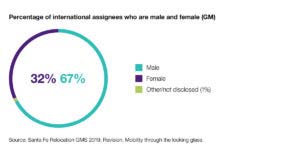Challenges of female international assignees
Challenges of female international assignees
We often hear that global experience is important, or even critical, for senior leaders and board members. That makes sense in a globally connected yet diverse business world. We also hear that businesses with more females in senior leadership roles perform better, and in many organisations and even countries, gender targets must be set and reported. So, put two and two together and you get the importance of global experience for females in order to reach senior leadership positions. Has this mathematics got through to organisations? Well, it’s getting there!
Santa Fe’s 2019 Global Mobility Survey shows the dial is moving quickly in the right direction. It was reported that in 2018 32% of mobile employees were female – a huge jump from 25% in the prior year.

This is certainly an encouraging picture, and may be due to a number of factors, including: greater awareness of unconscious bias, greater focus on meeting gender targets, more variety of assignment policies and duration enabling mobility to a broader candidate pool, and more. As the female assignee population increases, what can we learn from those who have gone before? Are there unique challenges that females need to be aware of before deciding to accept an assignment? Not all the following are unique to females, but it’s certainly worth being aware of some of the issues females face, in order to be fully prepared for the move overseas:
+ Equality is not the same everywhere. Some locations may not have many females in the workforce, and it may be difficult to integrate into the workplace. A female assignee may be the pioneer to pave the way for future females, but they need to be aware of the challenge this may be for them and their colleagues.
+ An accompanying male partner may not be as welcomed as a female. Similar to the above point, the network for accompanying males may be small and difficult to get in to. An unhappy partner is one of the most common reasons for assignment failure.
+ Safety concerns. In some locations, additional security measures may be needed for female expatriates, such as drivers, home security, personal security briefings etc.
+ Reduced time for family. Being in a new role in a new country is exciting, but may also take up more of your time than at home, particularly if you are now the single income earner for a while. This can impact how and when you spend time with your family, and routines and expectations may need to be managed to ensure your family is well settled.
None of these are insurmountable, and with proper planning, information and guidance, females should start to represent a more even proportion of the mobile employee population. This in turn will have a positive impact on business!
Download and read the full report: 2019 Global Mobility Survey ‘REVISION: Mobility through the looking glass’.

